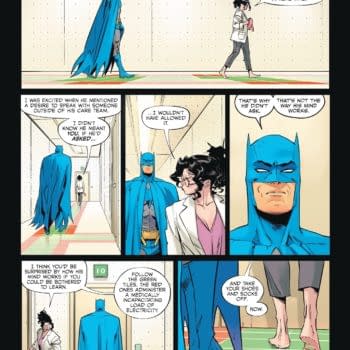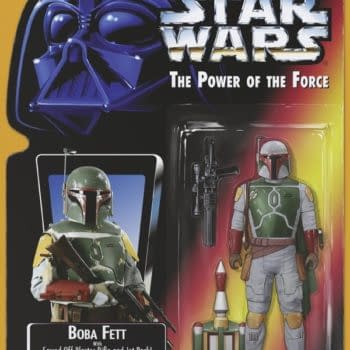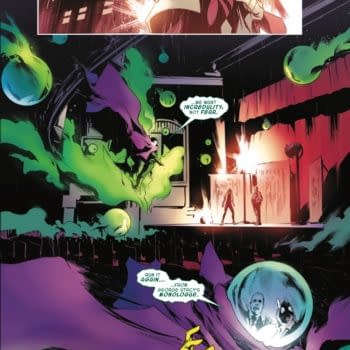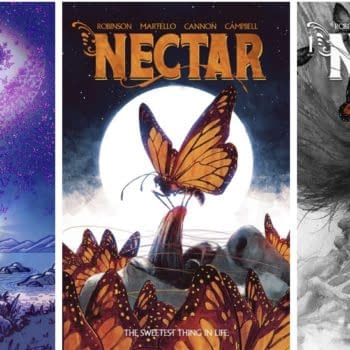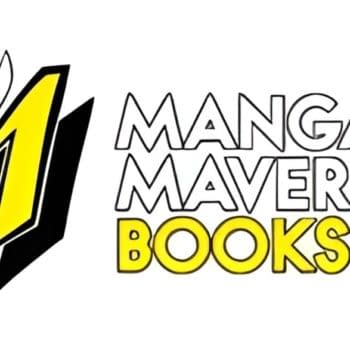Posted in: Comics | Tagged: Brooklyn Blood, Comics, dark horse comics, dark horse presents, entertainment, Paul Levitz, Tim Hamilton
Exclusive: Paul Levitz Returns To His Roots To Write Brooklyn Blood For Dark Horse
Paul Levitz is returning to writing comics now that his tenure at DC Comics has come to a close, and while he'll continue teaching, which takes a fair amount of his time and attention, this represents a new phase for him creatively. Last week we saw the arrival of Doctor Fate from DC, and readers might have wondered what's coming up for Levitz. We're happy to announce today that his next project, appearing in December 2015 will be the detective, occult series Brooklyn Blood. Serialized over as much as a year and a half in as many as 15 installments in the anthology Dark Horse Presents, the story will be illustrated by Tim Hamilton and be set, as the title suggests, in Levitz's native Brooklyn.
Brooklyn Blood will feature Irish cop and Iraq/Afghanistan war vet Billy O'Connor and a fellow female Arabic-American detective Nadira Hasan. The series will focus on experiences that will challenge their perceptions of the explained and unexplained, all turning on Brooklyn's history, the mysteries of which initially inspired Levitz to create the story.
We're happy to have Paul Levitz here today to talk about this phase of his career, the impetus behind Brooklyn Blood, elements of genre, and a generational shift in comics which he finds very promising indeed.

Paul Levitz: Are you in the New York area these days?
HMS: I'm in North Central New Jersey and have considered moving to Brooklyn many times, but financially it's been a hard decision to make.
PL: Yes, as a Brooklyn boy, it's hard not to think, "You could have bought five blocks in the old days for the price of that apartment".
HMS: Exactly. So, where exactly are you from in Brooklyn?
PL: I grew up in Flatbush, which is kind of equidistant from the ends of all the subway lines, so it's perfectly inconvenient. That was a dinosaur's age ago, since I moved out of there in '76 when I was a kid. But my daughter has been living out there now for the last decade or so. That's gotten me back on the streets a bit and I'm trying to draw on the old adage of "Write what you know". I'm a New York history buff. The mystery that drives the Brooklyn Blood story nests very thoroughly in New York City history.
HMS: I was wondering about that, and what makes you feel that Brooklyn is a spooky place with mysteries to uncover.

HMS: I was reminded recently by Alan Moore that Edgar Allan Poe's story, Marie Roget, based on a true murder story, is set in Brooklyn. Her body washed up in Red Hook, I believe.
PL: That wouldn't surprise me! Lots of things wash up in Red Hook.
HMS: So, is it your historian's instinct that has prompted Brooklyn Blood?
PL: Well, it's when you start putting the pieces together. As my daughter has informed me, "Brooklyn is cool now, not like when you were living there". It's a place I know and love, and can work with fairly easily. I connected with Tim Hamilton, a very talented artist, who is living in Brooklyn so knows it very well. It's very much a street-level story rather than just a supernatural story. You start asking yourself what you can build from this, and the elements of the story, bit by bit, come together for the protagonists to unravel.
The structure for this as it will appear in Dark Horse Presents is to use 8 page chapters. That will build up as a 15 part serial that will roll out over a year and a half probably. We needed a certain number of incidents and plot elements to compound the story over that time. It's basically like building a graphic novel chapter by chapter, hopefully paced so that it's entertaining in that form.
HMS: Is this the first time you've written something in those kinds of increments in such a long serialization, spread out so much?
PL: Well, it's the first time I've written anything like this for this kind of audience. I did a strip called Starman with Steve Ditko years ago that was done in 8 page episodes. We made it to about 10 issues before it got cancelled. But it wasn't built in a world where you could optimistically hope that ultimately it could be put together in a single volume. That really changes a tremendous amount about the way you structure something.
HMS: Right. Is that satisfying to you, the idea that at the end, the audience might be able to hold this as a single narrative and read it a little differently because of that?
PL: Yes. There's an artificial distinction that we've made in the field in the past few years between the original graphic novel and the compiled graphic novel. Speaking of Alan Moore, Watchmen was a serialized story, and Dark Knight Returns was a serialized story. But Tarzan was serialized. You can build something that is both a serial and hopefully, ultimately a bit of a novel too.
HMS: Absolutely. I always like being able to see a work in both forms and compare, actually. Plus there are often different elements in trade editions that help inform the world of the story.
Why did you particularly want to write a cop story right now? Are these things you've been keeping in the back of your mind for some time until you got an opportunity to work on them?
PL: No, I tend not to be the kind of writer who has a full notebook of things to work on someday. I tend to be what you might call a "short order cook", who writes something when there's an opportunity to write it. I'm a great fan of detective stories. It's a big part of where I learned my craft, going back to Dorothy L. Sayers, Agatha Christie, and Ed McBain. That's where I learned elements of comic book storytelling structure. So it's always been something I thought would be fun to do.
Then, when you look at something like Dark Horse Presents, it seemed like a workable kind of story to do in that format. There are police detective protagonists, and though there are supernatural elements, you don't have to have cosmic fight scenes going on for 3 to 4 pages at a time, which wouldn't fit well in an 8 page story. You can tell the human journey of the cop trying to figure out what is going on, and maybe you can tell some supernatural elements for a page, but most of it will be handled in a fairly realistic way.
HMS: It seems like detective stories are really good for encouraging reader participation as well, which helps a serialized story have a more solid feel. They are engaging it actively rather than waiting for the story to come to them, if that makes sense. They'll be trying to remember the pieces and put them together over time.
PL: Sure. A certain percentage will be trying to put together the pieces before the detectives in the story. A certain percentage will just be going along for the ride, but that's fine too. You have to build it both ways so if you want to figure it out, you can add something up. Agatha Christie was the incomparable master at that.
HMS: What's the appeal of having a duo, two partners at the center of this story, for you?
PL: Well, you start off in that situation because it gives your protagonist someone to talk to. You've got a surrogate character for the reader so that they can be learning alongside the character. Classically, that was Watson to Sherlock Holmes. But it also gives you the opportunity to have lots of diverse people included. The lead here is Billy O'Connor, an Irish cop and veteran back from Iraq or Afghanistan, which remains obscure. His partner is a slightly younger woman of Arabic descent, probably first generation American. That brings us variation in their view of the supernatural, since they are coming at it from different directions.
HMS: Are they religious?
PL: Neither one seems to be particularly religions in terms of the story as I'm telling it. Again, working with 8 page scenarios, there's a limit to how much depth you can get into. We may get into some of it before we're done. I'm 6 scripts in and Tim has done about 4 right now.
HMS: Wow, that's great. I think that people, regardless of whether they are religious or not, tend to carry with them certain expectations from their cultural milieu that would affect their view of the supernatural.
PL: For the most part. If you grow up immersed in something, you absorb what you might call "the primal myths of your tribe". Whether you subscribe to it or not.
HMS: Exactly. That's an excellent way of explaining it. What made you want to write about two characters who have such different backgrounds than your own?
PL: It's an interesting world. I had a dear friend growing up who had an uncle who was an Irish cop in Brooklyn, so I guess I'm channeling a mixture of my buddy and his uncle there. I've not had a close friend who's an Arabic woman, much less one who is a New York City cop, which I doubt is a common combination. But we live in this diverse world, and we should be telling stories about it. One of the comments I've made talking about Doctor Fate, and it's applicable here too, is that in coming back to writing now, I'm able to play with all these tools that weren't available 20 odd years ago when I was writing comics.
Part of what I want to do is pick up these tools, try them, see what I can come up with, and see how that changes the story. It's such a delight when you pick up a random stack of comics today and see all the experimentation going on, the different elements of being human that are being explored, and I hope that I have something to contribute to that development.
HMS: Thank you. That's a great summation of your experience returning to writing. Walking into a comic shop right now, the number of comics on the wall is amazing, and especially that they are so very different in content and voice. It's like swimming around in opportunity as a reader.
PL: It's a wonderful moment. I think it's the most creative moment American comics have ever had. It feels like we're really just beginning to scratch the surface and I think we're going to see the explosion continue for at least another decade. I use the metaphor in my teacher that if you think of creative subject-matter as a 360 degree circle, and look at manga in Japan, they explore pretty much the whole 360 degrees. Books about cooking, Abraham Lincoln, death and dying, sexual practice whether imaginable and unimaginable, you'll find them.
What they've done with Bande Dessinee in France isn't 360 degrees, but maybe 180 degrees. Certainly more than half of the circle. If you look at American comics when I came in, in the 70's, we were at 5 or 10 degrees. And in the last 25 years, thanks to changes in business structure and some very daring, creative people, we've seen that expand year after year, and with it the audience has expanded too. You put out Sandman, and you have different people turning up to read it in the shops and stores because it's a flavor they like and there never was a flavor like that available in comics before. You put out Raina Telgemeier's work and you see an explosion of young girls buying it who weren't buying graphic novels a few years ago. Each one of these people opens doors. It's a great time for comics.
HMS: And you find that liberating as a writer, yourself?
PL: I don't know that I can rise to expanding the circle significantly. I suppose time will yet tell. But it's liberating to me as a writer that I'm writing different kinds of stories and moments than I could have written before. That's wonderful and joyful. Some of that is very small and personal, to craft an episode of Brooklyn Blood where I literally know every street the guy is walking on and I'm guiding him through, deciding what could plausibly happen on that street corner. Knowing that if he turns that corner he could come upon an old stone house, which could be a meaningful place, whether we tell the reader so at that exact moment or not. I couldn't do much of that last time out as a writer. We'll see whether people care, but for me as a writer enjoying myself, it's very rewarding.
HMS: What's your strategy for presenting the supernatural in a way that can engage the reader, regardless of what their personal beliefs may be?
PL: Firstly, I don't think there's only one way to do it, and I don't think I stick to one way of doing it in all of my stories. But secondly, I think we're living in a really interesting time, not specific to comics, regarding young peoples' interest in what's called the "unnatural" rather than the supernatural.
When my generation was growing up, there was tremendous technological change, but it was on the industrial level. Nothing much changed in my home. The generation that has come of age now has lived through constant personal, technological change. A big effect of that is what I call "the impossibility barrier". You know there are no vampires, you're educated, you're deeply steeped in fiction and know where the legends came from, but on some level you have an emotional reaction that, "It doesn't mean there couldn't be. Someone could come up with a virus that could create something that's a lot like a classic vampire was".
HMS: Absolutely, yes.
PL: I think that's partly an explanation of why Young Adult Literature moved from being mostly Judy Blume's tales of real life to being mostly what's classed as "magical realism". I think that's why you see the profusion and television and film of what would have been a restricted audience a generation ago.
HMS: That is an amazing change that we're seeing, I agree.
PL: Some of the cause is that we've done some good comics and produced good science fiction, and the people who read it grew up and want to bring it to a wider audience. They became the Joss Whedons of the world, the directors and the creators. But some of it is just that you guys don't really believe anything is impossible.
HMS: Warren Ellis is a great person to go to in order to find weird Futurist articles, and you can subscribe to his newsletter and learn about all kinds of strange possible things. Separate from that but related, I just read an article today about how our exercise bracelets, like Fitbit or Apple watches, will soon be a microchip implant, or better yet, a pretty tattoo. It's just crazy what is possible or will be soon.
PL: I've always thought that some of the work that Warren did with us in the past, like Transmetropolitan, was just an incredible book. I think it was some of the best work we did at that time.
HMS: He really has an eye for looking toward the future.
One last thing, how do you think that working as an educator has influenced you as a writer? You mentioned writing about different types of people, for instance…
PL: Well, first and foremost, I get to be in the room with these people. Depending on the term, I get to meet somewhere between 50 and 100 kids between ages 18 and 25. I've taught kids from Nepal, Turkmenistan, Sweden, Saudi Arabia, China. I've taught in China. I went to a digital publishing conference there a couple of years ago and did a keynote and got to spend some time with the students. I'm hoping that if I'm open-minded and intelligent, that's all adding to who I am. You learn by teaching because you literally learn from your students, and you also learn by having to present your thoughts and arguments to your students. It forces you to codify your knowledge to your students in ways you hadn't before. I find it an absolutely delightful part of my life.
HMS: It's hard work, but I had similar experiences myself teaching for about 10 years. There's an element to which it's a privilege just to be around so many different types of people and pick things up from them, more than you ever could online or from a book. It's a level of experience that's irreplaceable.
PL: Yes. Particularly for me, because I grew up in a very narrow and parochial environment. The Brooklyn of my time was Jewish and Italian first generation kids, with a few Irish kids scattered around the edge. Everybody was working class. The only professional you met was the doctor you were taken to, most likely. It was only when I broke out of that environment, went to high school in Manhattan, and began doing fan activities, that I really widened the circle of people that I knew. It was utterly unimaginable for the 13 year old me to have a friendly relationship with someone from Turkmenistan, someone from Brazil, or someone from Nepal. That's been a great joy.
HMS: Is there anything else you'd like to add about this project for readers?
PL: Well, Tim is doing a beautiful job. He has got a fascinatingly imaginative style. He's very immersed in the Brooklyn atmosphere. Clearly it's not an astonishing work that's going to shake up the comic book industry, but…
HMS: You never know! You could do something strange that you're not even aware that you two are doing that changes things.
PL: I don't know that I'm that writer. But I hope people enjoy it.











